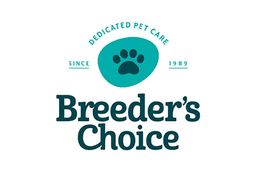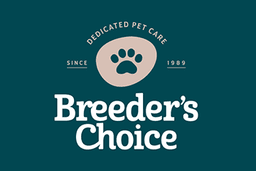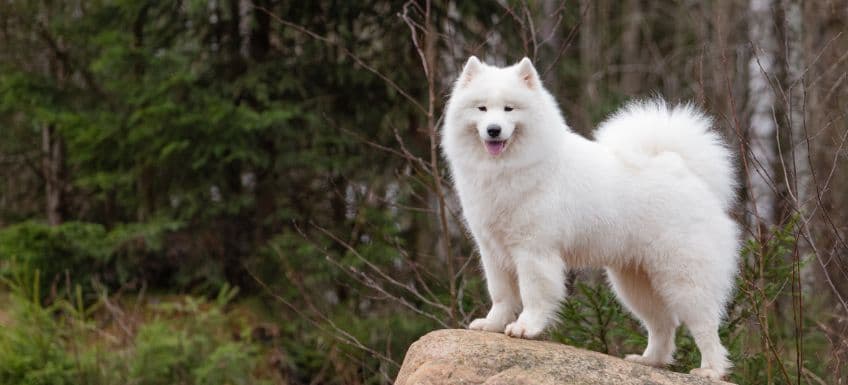The Samoyed, with its luxurious white fluffy coat and iconic “Sammie smile,” is an ancient breed from Siberia. Originally bred by the nomadic Samoyedic people, these dogs were essential companions in herding reindeer, pulling sleds, and even keeping their owners warm during harsh winters. Friendly and playful, Samoyeds are known for their independent yet eager-to-please nature, making them popular family pets today.
Samoyeds are medium to large-sized dogs, typically standing between 46 to 56 cm tall and weighing between 16 to 29.5 kg. Their thick, double-layered coat is usually pure white, though some may develop a cream shade as they age. With a life expectancy of around 12 to 14 years, Samoyeds are a long-term commitment for any household.
In Australia, while Samoyeds are adored for their friendly and affectionate nature, they thrive best in cooler climates, making them more suited to regions where they can comfortably enjoy their thick, fluffy coats without the challenges of extreme heat.
Samoyed Dog Breed Facts & Characteristics
| Dog Breed Facts & Characteristics | Details |
|---|---|
| Origin | Siberia (Russia) |
| Also known as | Bjelkier, Samoiedskaya, Sobaka, Smiley, Sammy |
| Bred for | Herding, guarding reindeer, sled-pulling, companionship |
| Size | Medium-large; 46 to 56 cm in height |
| Weight range | 16 to 29.5 kg |
| Colours | White, cream |
| Life expectancy | 12 to 14 years |
| Coat | Thick double coat, sheds year-round |
| Temperament | Playful, independent, sociable |
| Exercise requirements | High |
| Best suited for | Active households, cooler climates |
| Apartment friendly | Better suited to larger properties |
Personality
Samoyeds are known for their friendly and playful nature, making them loyal family members. These intelligent dogs need plenty of exercise and mental stimulation to prevent boredom, which can lead to barking or mischief. They thrive best in larger homes, especially in cooler climates, and benefit from early training due to their independent streak. With the right care, a Samoyed can be a wonderful companion in an active, experienced household.
Grooming
Samoyeds have a thick double coat, composed of a soft, woolly undercoat and long outer guard hairs. Regular grooming is essential to manage their shedding, which typically occurs seasonally. During these times, more frequent brushing is necessary to prevent matting and tangling. Flea control year-round is recommended, as is tick control if you live in a tick-prone area. Regular grooming routines should also include nail trimming, ear cleaning, and dental care to maintain their overall health and appearance.
Feeding
Feeding a Samoyed requires a high-quality large breed dog food that is rich in protein to support their active lifestyle and muscle development. Healthy fats, particularly omega-3 and omega-6 fatty acids, are important for maintaining their thick, luxurious coat. Since Samoyeds can be prone to obesity, it’s essential to follow the recommended feeding guidelines based on their age, size, and activity level.
To prevent bloat, a condition that can affect large-chested breeds, it’s advisable to divide their daily food intake into two meals. As they age, consider incorporating joint supplements to support their joints and help prevent issues like hip dysplasia. Always provide fresh, clean water and monitor their weight regularly to adjust their diet as needed.
Common Health Concerns
Samoyeds are generally healthy dogs, but they are prone to certain health issues. The most common reasons for vet visits include osteoarthritis, dietary indiscretion, eye conditions, and skin infections or allergies. Regular vet check-ups and a proactive approach to health care are essential to manage these potential issues.
Did You Know?
Did you know that Samoyeds were once used in expeditions to the North and South Poles? Their strength, stamina, and willingness to work made them invaluable in exploring some of the harshest climates on Earth.
Samoyed FAQs
How much does a Samoyed cost in Australia?
In Australia, the cost of a Samoyed can range from $2,000 to $6,000, depending on the breeder, lineage, and location. Additional costs such as vaccinations, grooming, and regular vet check-ups should also be factored in when considering this breed.
Are Samoyeds good with children?
Yes, Samoyeds are generally good with children. They are known for their gentle and playful nature, making them great companions for kids. However, due to their size and energy levels, it’s important to supervise interactions, especially with younger children.
How much exercise does a Samoyed need?
Samoyeds are a high-energy breed that requires plenty of exercise. They enjoy long walks, hikes, and playtime in a secure yard. Engaging them in dog sports like agility or obedience training can also help keep them physically and mentally stimulated.
Do Samoyeds shed a lot?
Yes, Samoyeds are heavy shedders, particularly during their seasonal shedding periods. Regular brushing is necessary to manage shedding and keep their coat healthy. During shedding season, more frequent grooming is required to prevent matting.
Are Samoyeds easy to train?
Samoyeds are intelligent but can be independent and stubborn, which can make training a challenge. Early socialisation and consistent, positive reinforcement techniques are crucial for effective training.
Can Samoyeds live in an apartment?
While Samoyeds can adapt to apartment living, they are better suited to larger properties with plenty of space to roam. They need regular exercise and mental stimulation to prevent boredom, which can lead to excessive barking and destructive behaviour.
What do Samoyeds eat?
Samoyeds should be fed a high-quality, balanced diet appropriate for their age, size, and activity level. It’s important to follow the recommended feeding guidelines and monitor their weight to prevent obesity, which can lead to other health issues.





























